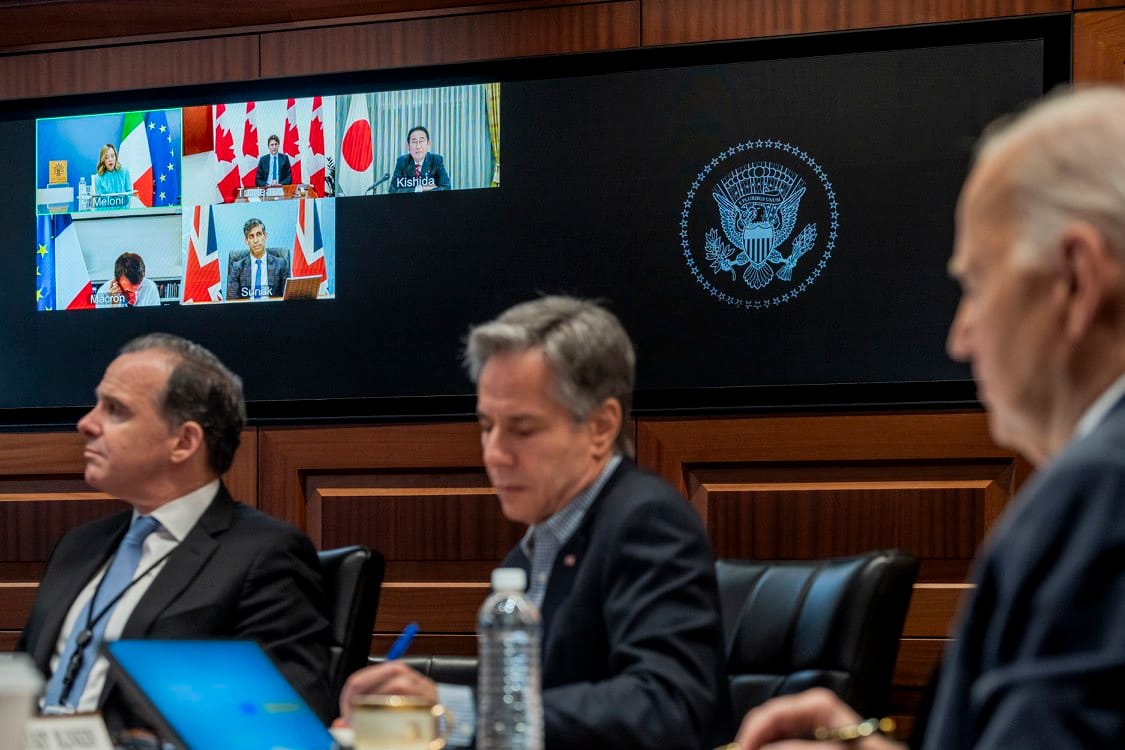G7 Urges De-escalation: Pushing Israel to Refrain from Retaliation
"If you're sitting in Israel this morning, you're thinking quite rightly, we have every right to respond to this and they do. But we are urging that they shouldn't escalate." said British Foreign Secretary David Cameron
President Biden has taken charge of orchestrating the diplomatic response to Iran's attack on Israel. After extending congratulations to Prime Minister Netanyahu for their success in thwarting the attack, Biden highlighted the importance of carefully considering the next steps. He emphasized the need for Israel to exercise caution and take time to deliberate on how best to respond. By urging Israel to "slow things down and think through" their options, Biden aims to ensure a measured and strategic approach to addressing the situation, prioritizing stability and de-escalation in the region.
The initial step in President Biden's diplomatic response was to prevent immediate Israeli retaliation, which was accomplished through a phone call with Prime Minister Netanyahu at 4:00 AM Israeli time on Sunday. The second step in President Biden's diplomatic response involved convening a video call with the leaders of the Group of Seven (G7) to address Iran's attack on Israel.
Following a video call to address Iran's attack on Israel, the leaders of the Group of Seven (G7) nations released the following statement on Sunday:
"We, the Leaders of the G7, unequivocally condemn in the strongest terms Iran's direct and unprecedented attack against Israel. Iran fired hundreds of drones and missiles towards Israel. Israel, with the help of its partners, defeated the attack.We express our full solidarity and support to Israel and its people and reaffirm our commitment towards its security. With its actions, Iran has further stepped toward the destabilization of the region and risks provoking an uncontrollable regional escalation. This must be avoided.We will continue to work to stabilize the situation and avoid further escalation. In this spirit, we demand that Iran and its proxies cease their attacks, and we stand ready to take further measures now and in response to further destabilizing initiatives. We will also strengthen our cooperation to end the crisis in Gaza, including by continuing to work towards an immediate and sustainable ceasefire and the release of hostages by Hamas, and (to) deliver increased humanitarian assistance to Palestinians in need."
On behalf of EU Member States, I condemn in the strongest terms the Iranian attacks against Israel and call on all parties to exercise utmost restraint.
— Josep Borrell Fontelles (@JosepBorrellF) April 14, 2024
I just spoke to Iran’s FM Abdollahian to convey these messages & urge Iran not to escalate further.https://t.co/spGKwAuMXW
At the same time EU foreign policy chief Josep Borrell, describing the Iranian attack as "an unprecedented escalation and a grave threat to regional security," announced on Sunday afternoon that he had convened a videoconference meeting of EU foreign ministers for Tuesday. Borrell stated on X, "Our objective is to contribute to de-escalation and security in the region."
Chancellor of Germany, Olaf Scholz, added: "This is an inexcusable attack, it is a serious escalation of the situation. It is in no way acceptable, understandable, or acceptable. We can only warn everyone, especially Iran, not to carry on like this."
Besides obvious solidarity with Israel, the leaders of the Group of Seven (G7) reached a consensus to exert pressure on Israel to refrain from immediate retaliation.
British Foreign Secretary David Cameron cautioned Israel against retaliation following Iran's drone and missile attack, asserting that Tehran's action had largely failed. He emphasized the importance of maintaining focus on negotiating a ceasefire in Gaza. Cameron stated to Sky News on Monday:
"If you're sitting in Israel this morning, you're thinking quite rightly, we have every right to respond to this and they do. But we are urging that they shouldn't escalate."

While the G7's decision to pressure Israel not to respond to Iran's attack may be viewed as an attempt to prevent further escalation, it has also drawn criticism from various quarters. Critics argue that such pressure could undermine Israel's right to self-defense and signal weakness in the face of aggression. They contend that by prioritizing de-escalation over Israel's security concerns, the G7 risks sending the wrong message to Iran and other adversaries in the region.
Israel's response to the Iranian strike on Sunday remains uncertain, as cabinet ministers are divided on the timing and extent of any potential retaliation. While Ministers Benny Gantz and Gadi Eizenkot advocated for a preemptive counterattack even before the Iranian drones and missiles reached Israel, Prime Minister Benjamin Netanyahu, Defense Minister Yoav Gallant, Strategic Affairs Minister Ron Dermer, and the Chief of Staff opposed such a move. They view such a response as too limited compared to other options that had been under discussion in the days leading up to the attack. This disagreement within the Israeli leadership underscores the complexities and strategic considerations involved in determining the appropriate course of action in response to security threats.







